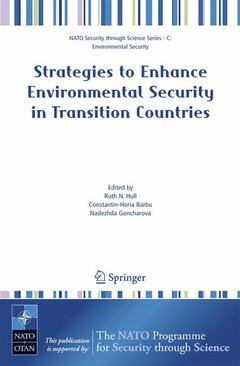Strategies to Enhance Environmental Security in Transition Countries, 2007 Nato Security through Science Series C: Series
Coordonnateurs : Hull Ruth N., Barbu Constantin-Horia, Goncharova Nadezhda

It is the goal of environmental security to protect people from the short- and long-term ravages of nature, man-made threats and deterioration of the natural environment. Environmental security includes activities related to pollution prevention, environmental conservation, compliance with regulations and environmental restoration. It is a challenge for transition countries to support all of these activities, due to limited resources, competing priorities and the fact that most environmental regulations, assessment methods and procedures, and restoration techniques were developed in countries where resources were not limited. This volume presents the main environmental security challenges facing transition countries, as well as practical methods and approaches for addressing them. These approaches are equally applicable to all countries. The four basic topics this volume addresses are (I) Introduction to Environmental Security Challenges (II) Strategies, Methods and Approaches for Addressing these Challenges (III) Lessons Learned as Illustrated via Research and Case Studies (IV) Issues Related to Metals in the Environment. The final chapter of the book is a summary of the discussions and working group sessions, entitled "Environmental Security in Transition Countries: Knowledge Gaps, Hurdles and Effective Strategies to Address Them".
Date de parution : 05-2007
Ouvrage de 429 p.
15.5x23.5 cm
Thèmes de Strategies to Enhance Environmental Security in... :
Mots-clés :
Environmental; NATO; Science; Security; Sub-Series C; biology; development; ecology; emissions; environment; pollution; ecotoxicology


